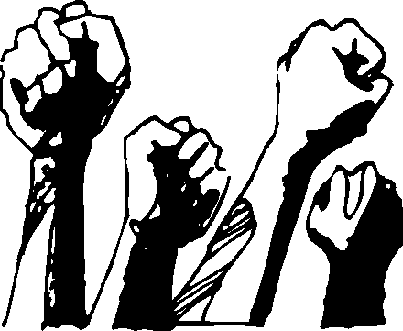The crowd frequently chanted the by-now old standby: "This is what democracy looks like!" and many signs reflected that same opinion in that form or another... all of which, of course, made me grit my teeth in frustration.
These protests are not a sign of 'democracy'. On the contrary, given that this legislation was voted upon by the majority of both houses of the Wisconsin legislature; and both of said houses are comprised largely of Republicans duly elected by the majority of Wisconsin citizens; and the legislation was signed by Wisconsin's equally duly elected governor, one could reasonably say that the legislation itself is what democracy looks like. This is what the state voted for: a collection of ideologues so immersed in their religion that Goldwater would be nauseated (and probably equally appalled at the waste of time and money the governor of Maine has expended in dealing with paintings he doesn't like.)
Standing up for one's rights is not an example of 'democracy'. Far from it; especially if one is referring to the bastardized system of government that the United States uses and likes to proclaim to the world as 'democracy'. As pedants will like to point out, the United States wasn't even intended to be a democracy. It was intended to be a republic. Of course, since most of the so-called Founding Fathers intended that the republic be based upon that same style of government employed by the Romans prior to Caesar, our government, like theirs, is no closer to being an actual republic than I am to being president. The average Roman citizen did not have a republic and neither do we.
We have an oligarchy.
Just like Rome, our government was owned originally by wealthy families. In the case of Rome, they called these clans 'patricians'. In our case, we called them 'plantation owners and titleholders in Britain.' In the case of Rome, when the people had finally had enough of hereditary clan rule, they revolted, most notably under the Brothers Gracchi, and were finally invited to share in some of the exercises of government. All that did, of course, was gain nominal representation for the average Roman in the form of the tribunes and invite wealthy plebeians to run the government alongside the wealthy patricians. Eventually both were owned by equally wealthy Greek, Italian, and Roman merchants and everything continued on in true oligarchic fashion. The same thing happened here, in that we often see hereditary exchange of office controlled by a few wealthy clans and they and others like them are often completely owned by merchants we now know as 'corporations'. In Rome, one bought oneself down the cursus honorum (military tribune to quaestor to aedile to praetor to consul and then possibly on to censor or provincial governor) by using other people's money whom you would then repay by granting rights of trade to areas or routes. In the US, you often perform the same journey: state officer to representative to senator to president or governor; all of it done with someone else's money whom you then repay with legislative or regulatory favors.
In ancient Rome, you had to do something pretty egregious or have made more than the usual assortment of enemies to get accosted for the open bribery that made the system function. No one walked the cursus without bribing people; often the voters themselves in their centuries. Same thing here.
We don't have a democracy. We don't have a republic. We have an oligarchy. And they own you. They own everyone. So, standing in the streets, protesting the actions of one's own elected officials, who freely engaged in the institutionalized bribery known as our electoral system, suggesting that what you're doing is an example of 'democracy' in action is very, very far from the truth, either real or imagined. The better concept to keep in mind is not democracy, since that's always been a somewhat questionable concept to begin with. As Isaac Asimov often complained:
"There is a cult of ignorance in the United States, and there always has been. The strain of anti-intellectualism has been a constant thread winding its way through our political and cultural life, nurtured by the false notion that democracy means that "my ignorance is just as good as your knowledge."
No, the better concept to keep in mind is justice. Justice is what we're talking about when we argue that the right of workers to bargain together is essential to their well-being. Justice is what we're talking about when we see people in the wealthiest nation in the world going without healthcare and those people that actually have access to it as a part of their employment are about to see it stripped away. Justice is what we're talking about when the living standard for the average employee, public or private, hasn't appreciably improved in four decades while the wealthiest have seen their income and assets skyrocket. Justice is the essence of tens of thousands in the streets, shouting their anger at the people who so boldly treat them as if they were expendable; as if their lives and their families didn't matter; as if their labor and time were something to be used and tossed away; as if they were... plebeians. And not wealthy ones, at that.
Don't talk to me about what democracy looks like, because I've never seen it in my lifetime and neither have you. Talk to me about justice. Talk to me about basic rights denied. Talk to me about equality. Talk to me about a wealthy class so grasping that hundreds of millions in "bonuses" remains not enough to satiate their desire. Talk to me about casting aside the corrupted system, as Jefferson suggested, and then I will join you in the streets every minute of every day. And then we will talk of revolution.
If you tremble with indignation at every injustice, then you are a comrade of mine. - Ernesto 'Che' Guevara.


